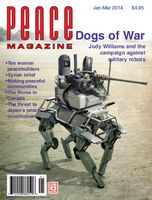
Peace Magazine Jan-Mar 2014, page 4. Some rights reserved.
Search for other articles by Metta Spencer here
If you can’t stand even to discuss Syria’s civil war these days, you’re not alone. Few Canadians are doing anything to aid the victims and refugees in Jordan or Turkey, who live in tents, melt snow for drinking water, and lack schools, adequate food, toilets and sometimes even shoes. Why are we so passive? Mainly because we cannot know whom to support or even how to help. There seem to be no “good guy” factions—only bad and worse ones—who all are killing each other.
As we go to press, two news items illustrate this paralyzing uncertainty. The United States is ceasing to send non-lethal aid to the Syrian rebels, since the radical Islamist fighters have seized the supplies they previously gave to the Supreme Military Council of the Free Syrian Army. Until recently the US pointedly underestimated the strength of Islamist fighters such as al-Nusra and the numerous affiliates of al-Qaeda. But now even the military are nonplussed.
The second current news item comes from the journalist Seymour Hersh, who is again questioning the source of the chemical weapons attack of August 21on a rebel-held Damascus suburb—the event that almost induced Obama to attack Assad’s chemical installations. In a London Review of Books article of Dec. 19, 2013, Hersh alleges that Obama was too quick to blame the Syrian military for the sarin gas attack. Hersh argues convincingly that the US intelligence had not known beforehand that the attack was being prepared. Had they known, they presumably would have warned the victims to protect themselves. Instead, after the attack, the US intelligence searched through the recordings they had captured, looking for retrospective proof. Hersh does not exactly say whether they found such proof.
Hersh says the rebel groups are able to make sarin themselves, though he does not speculate which of them (if any) actually used it. The IAEA inspectors were not authorized to identify the perpetrators, but other intelligence and human rights groups calculated the shells’ trajectory, tracing them back to a brigade site near Assad’s headquarters. Hersh suggests that perhaps someone tampered with the evidence about the shells, though his argument is less than compelling. He implies, without actually asserting, that the sarin attack may have been perpetrated by one of the Islamist fighting groups against those other rebel groups that Obama had been supporting.
Few will be convinced by this but, sad to say, it can hardly matter to us anyway. There is no military solution to the crisis. The sarin attack killed hundreds of Syrians and the war has ruined millions of other lives: two million refugees in neighboring countries, six million needing help inside Syria, and four million internally displaced. The tragedy began because rebels resorted to violence. Now the only thing we can do is aid the victims—whether they are “good guys” or not—and support the diplomats who are searching for solutions. So let’s do so, Canada!

Peace Magazine Jan-Mar 2014, page 4. Some rights reserved.
Search for other articles by Metta Spencer here